Alrighty folks. Today marks our glorious return to Otherworld, and boy do we have a doozy of an interview for you this week! After something a little dark and dreary, it’s time we move on to something lighthearted.
Our latest stop is in Iorden, a realm created by Christian Madera and Zach Glass. The guys, together with a hugely talented cast and crew, bring us The Once and Future Nerd, an audio series that pokes fun at the fantasy genre while simultaneously embracing it. Their team is amazing, and it really is worth checking out. In the meantime, read on to witness an incredible interview.
Tellest: This is a huge undertaking! I spend a few days preparing for each interview, and I barely scratched the surface of The Once and Future Nerd. How long did it take you to get everything lined up for this stunning project?
Christian Madera: Haha, a while. The short answer is: more than 18 months from first discussing the idea to putting something out in the world. The earliest thing from this project that I have saved on my computer is dated February 2012. Most of that first year was spent really fine-tuning that first script (what became the first 6 episodes of the podcast), and figuring out what exactly we wanted the project to be. But once we decided on the format and started reaching out to people to gauge interest, everything kind of fell together remarkably quickly. We had our awesome cast and crew assembled in a couple of months. Then we went into production in March of 2013 and put out our first three episodes in September of 2013.
T: When I was going through the story you’ve already established, it had this remarkably robust feel to it. Even though it’s been just over a year, it almost seems as though you’ve been at it for much longer. It clearly has a beginning – the kids from Pennsylvania are completely out of their element at first – but you did an excellent job establishing Iorden. How much of the world do you know of beyond the contents of the audio play? Are there far off lands that we might not ever hear about but you know implicitly?
CM: Zach is great at all the world-building stuff. That’s a big part of why I went to him with this idea. We knew from the beginning that we wanted to make a comedy, but we also knew that the jokes we wanted to do would only work if the Fantasy world felt full and fleshed-out and lived-in. So we tried to make a world that “works,” so to speak, where it can function and have things going on when our characters aren’t there.
We pretty much have our whole map planned out, we’re gonna get around to publishing it at some point once we decide on an art style. And if you’ll permit me to tease some plot developments, Iorden also has a significant amount of landmass that’s been excluded from the maps…
Zach Glass: World-building Iorden was a lot of fun! In addition to the geography, we also know a little bit about the history of Iorden too. We haven’t had the patience to do anything nearly like the Silmarillion (every couple of weeks I feel guilty that I haven’t yet), but we have a fair idea about ancient history and mythology –which may work its way into either the story itself or some bonus material. The rest of history is a bit patchy, but we do know about some of the more momentous events that shaped the political landscape. Even if those are never explicitly mentioned in the story, we do actively consider them when we are planning the political machinations going on in the present time.
If I could bore you with an example, the whole relationship between the human nobility and the elven high council, the way that every human ruler gets an elven Kalth’yr advisor, that whole situation was set up in a peace treaty to resolve an ancient war (the treaty is called the White Forest Concordat). The details were designed to address the specific issues going on in Iorden at that time. We reference the Concordat in almost every “politics” scene, and of course Yllowyyn’s role as Kalth’yr is prominent to the story, but the details of that war will probably never come out.
T: You present the story in an episodic audio format, but it looks like you’ve got it all laid down in book format. How far ahead do you have it all planned out?
CM: Actually, it’s written like a television show first. The original plan was for this to be a TV show, and by the time we realized that it was far too expensive for two guys without any writing credits to have a prayer of getting it made, we were already too emotionally invested in the idea to stop.
Each of our “chapters” corresponds to what would be one episode of an hour-long TV show; each of our episodes corresponds roughly to one act of a TV show. Calling them “chapters” was kind of an aesthetic choice to give us an explicitly literary feel.
To finally answer your question, as of this interview, we have six chapters written, and are drafting the seventh. We have detailed outlines for the next three chapters after that, which will bring us to the end of the first “Book.” We’ve known how Book 1 was going to end for a very long time. There’s at least one subtle hint of the big reveal back in Chapter 1. Book 1 will equal about one season of an HBO-style show, or a medium-length novel. After that, we have vague outlines for how the rest of the series will go.
T: When TOaFN really takes off, can we expect you to resurrect the idea of making it a television show, or are you committed to the audio play in its entirety at this point?
CM: Let me make this abundantly clear: If anyone out there reading this has a few million dollars they would like to throw at two guys with no professional writing credits so that they can tell fart jokes about dragons, PLEASE GET IN TOUCH WITH US.
Haha, which is to say, I love what we’re doing now, but motion pictures have always been a dream of mine. So if we ever somehow developed enough clout that that could possibly be in the cards, we’d be all for it. Provided, of course, our hypothetical producers would let us retain the heart of the story and somehow compensate the hardworking people who carried us this far.
T: Because the story seems so well thought out and planned, it begs the question; why not present it as a novel? Was there a particular reason that you decided to perform it as an audio play? With all the roles being portrayed, do you find releasing content challenging in any way?
CM: I think I prefer working with actors instead of just by ourselves. One of my favorite parts of the writing process is sitting down with actors and discovering things about the characters with them. You find that, if you’ve got a healthy dialogue going with your cast, they’ll understand the characters really well – at least as well as you and sometimes better. And that can be invaluable when you’re in a tough writing spot.
I remember recently, there were these two scenes that I was really stuck on. In order for them to make sense and work dramatically, there were these really nuanced character motivations that needed to be exactly right. And I couldn’t quite get at them. I brought them to rehearsal, and the actors just figured it out after talking for a few minutes. They knew exactly what those scenes needed, and now they’re some of the best scenes we’ve written. Plus, it’s a great little ego boost when smart, talented people are engaging with your material that deeply.
Doing it as an audioplay definitely adds a lot more moving parts, so to speak. Coordinating the efforts of all the people involved feels like a full-time job in itself sometimes. But it’s so completely worth it.
ZG: The idea to go for an internet-based audio play came from a few different directions. Christian’s experience is entirely in film and television. The show was first planned as a TV series, but once we decided the odds of making an independent TVshow were pretty much non-existent, audio play seemed like a pretty natural alternative. Adapting a TV script to a radio script is a lot smoother than adapting it to novel format. Beyond that, I am a big fan of a number of different webcomics, and a regular follower of a bunch of podcasts too. Aside from enjoying the format, I came to appreciate the strengths of the internet serial distribution model. People spend a LOT of time on the internet, and this type of internet serial lets people wander in at any point in the story, and catch a single bite-sized episode or binge on a whole chapter or two, however they prefer. That format may be slightly better for webcomic than for podcast, but I think it still works. Finally, I think we were inspired by large-scale self-produced internet serial stories such as “There Will Be Brawl” (which is a hilarious live-action crime drama surrounding the Nintendo characters from Super Smash Brothers : Brawl).
T: As you begin to pick up speed and develop a repertoire with your audience, you’re going to be able to continue growing in some pretty awesome ways. Have you thought about dream cameos you’d love to include?
CM: Oh man. If I’m really allowed to dream, there are so many other artists I admire and would love to collaborate with. To spare you reading a novel just on this subject, I think I’m going to limit my answer here to just people currently doing work related to ours:
Emily Carmichael is a filmmaker who does these wonderful little 8-bit animations with really funny, well-written scripts. If you haven’t seen her short film “RPGOKC,” seriously go YouTube it right now. Her writing tone is similar to ours in many ways and I’d love to see what she could create in our world or what we could create in hers. Then there’s Dom Moschitti and Josh Henderson, who have a hilarious podcast called “Fantasy Fiction.” They do kind of what we do, except their stories are smaller and more self-contained and tend more towards farce whereas ours are more dark comedy. Would love to be on their show at some point and try my hand at what they do. Mack Leighty, who writes for Cracked as John Cheese, is allegedly working on some D&D novelization parodies. He’s a really smart writer with a black belt in penis jokes, so he’s someone I’d love to connect with. And then there’s The Sword, who are a great metal band out of Austin, TX. Their first hit was this awesome Sabbath-style track called “Freya,” which should tell you everything you need to know about the thematic threads of their songwriting and why they appeal to me. Oh, and Frank Waln. He’s a Sicangu Lakota rapper who talks a lot about the lingering effects of colonialism, and also he’s really good at Twitter and really into Game of Thrones. So there’s a lot I’d like to talk about with him.
ZG: Lastly–and this is WAY out in the future, as in the “we are as mainstream as Game of Thrones” future–We went through some unreasonable amount of effort to build in a really obscure reference to Bruce Springsteen that probably nobody will catch. If we could get The Boss to cameo in the role that pays homage to him, that would pretty much be the best thing that would ever happen in either of our lives. That may be asking a lot but, well…poor man wanna be rich, rich man wanna be king 🙂
CM: I’m not sure the people reading out there understand how much of a Springsteen fan I am. You know how Tolkien was a Catholicism “fan”? I’m that kind of Springsteen fan.

Hayes Dunlap (Yllowyyn), Rhiannon Angell (Nia), Anya Gibian (Arlene, Regan), Christian Madera, Julie Reed (Jen), and Ian Harkins (Narrator). This photo was taken by Paul Notice (Nelson).
T: The Once and Future Nerd is fantasy, but it’s also comedy. From the moment the narrator speaks in your very first episode, readers are privy to that sense of almost gallows humor. How do you balance the two different genres effectively?
ZG: The fun part about these genres is that they are not at all mutually exclusive. A lot of fantasy stories tend to take themselves too seriously. One of our biggest aims is to poke fun at some of the tropes that are externally ridiculous, but within the fantasy world are treated as Serious Business. That actually makes it really easy to find the right balance–by poking fun at ourselves whenever we fall into that trap. We just try to write a solid fantasy story, and those ridiculous stereotypical moments come up naturally. When they do, we make fun of them! True, we may sometimes nudge our characters a bit in the direction of a ridiculous situation … but always in a way that is consistent within the Fantasy genre. If the situation was TOO abnormal everyone would notice it as forced.
The trick is to know when to rein in the humor and allow the serious parts of the story to shine through. We do hope to tell a legit story, and discuss some serious social topics, so humor is not always appropriate. In this, having two writers has been incredibly helpful. When one of us missteps in either direction (too serious or too lighthearted), the other catches it.
The Narrator was almost a happy accident. The original TV script was not narrated. When we decided to switch to an audioplay format, it became clear that a narrator was necessary to move along the action scenes. Once he was included, it was only natural to have him slightly snarky, and from there things serendipitously fell into place, and he now really sets the tone of each episode. He keeps us serious when we need to be serious, and funny when that’s what’s called for.
CM: The first seed of this idea that I remember came to me while I was playing Skyrim. There’s this side quest where some guy is going to pay you a lot of money to bring him a weapon from the deity who almost destroyed the world in Oblivion. And when you bring him the weapon, he tells you to come to a shrine with him so you can summon that deity. And one of the dialogue options you get is “That sounds like a terrible idea.” That line was so funny to me. Probably because it felt so real, so human, in the middle of this huge, epic story. That is what any human in her right mind would say in that situation, Dragonborn or not!
I think that’s one of the places where I try to find humor – someone acting in a very mundane, even petty, way in face of incomprehensible stakes. Fantasy is great at unrelenting evil, at cruelty, at moral ambiguity, at selfishness…but I haven’t seen enough pettiness. We have that one scene early on where the party needs Ba’a lo-Ky’yr’s help but don’t want to pay him, so this great wizard makes his TA do it, and that’s how Nia joins the party. That’s still very funny to me. John Dies At The End by David Wong is another work that does this very well – that book has been a big influence on me.
T: In a way, you’re almost humanizing the characters more than traditional fantasy does. Do you find that having Billy, Nelson and Jenny as kind of guides in our interpretation makes that distinction any easier?
CM: Well I’d like to think that all the best fantasy humanizes its characters (except when it’s explicitly trying to make them superhuman, like with Aragorn or someone like that). I don’t know how else a human audience would understand characters except as other humans. Writing is all about character for me. So we try to have something human and relatable about even our most fantastical characters.
That said, I know what you mean. The daily, lived experiences of Billy, Jen, and Nelson are going to be more immediately relatable to our audience than, say Regan or Brennen. At least I hope they are! Haha I love Regan so much as a character but I absolutely do not want to meet anyone who can immediately relate to her day-to-day life. Parts of it, sure, but hopefully not the murder parts.
And having what’s typically called an “audience surrogate” is really helpful in any kind of fiction that requires a lot of world-building. You have characters who need the world of the story explained to them so that’s a good excuse to explain it to the audience. This technique has its pitfalls too, of course. You need to resist the temptation to do too much info-dumping; just because one character might plausibly say something to another doesn’t mean it’s the most interesting use of your audience’s time. You also have make sure that if the story goes on long enough, you shift or remove the audience surrogate, so that your characters don’t just seem dense. John Mulaney, who’s a former SNL writer, has this great standup comedy bit about how Detective Fin has been on Law & Order: SVU for many years now but still apparently needs to be walked through what a pedophile is every week. You don’t want to do that either.
ZG: Between the kids and the Narrator, we manage to always have an “outside” perspective. This is a pretty useful thing for us, both in allowing us to dictate some interpretation like you said, but also in providing some comedy. Some of my favorite jokes in the whole series are the ones where an outsider is pointing out how ridiculous something is. Things like the Narrator’s jabs at “a warlock by the name of Jobs [who] had long since mastered the art of convincing humanity to purchase devices without purpose” to snark at the iPad culture, I find those hilarious. And to give away a bit of a spoiler, in an upcoming episode, the party is asked to visit a location known as the “Cairn of Evil Untold” and the kids are like “no thanks, that sounds terrible, we’ll pass”.
To answer your question though, I think this outsiders voice definitely does help to humanize the story. In a lot of fantasy stories, all the characters are so in-grained in their own world and obsessed with their own tasks, that it never occurs to anyone (in-story) to ask some basic questions, and the author can’t spare the time to delve into everyday humanity. Billy, Jen, and Nelson are here to ask these questions. They have absolutely no desensitization to the realities of everyday life in Iorden, which gives us authors the perfect excuse to explore those realities. In the same way, Brennen, Regan, Nia, and the rest of the gang have no experience with our world, so we can use their eyes to explore our culture.
T: There are a lot of parts of the greater fantasy genre that you poke fun at, including MMOs and cosplay. What else is on the table that could be playfully mocked at?
ZG: Well I think everything is on the table…I don’t want to give away too many spoilers, but we have some small one-line digs coming up at some particular movies, a larger more general poke at all the detective-style TV shows (the whole CSI-like genre), and the usual smattering of video game references. You may have already noticed that we like to have fun with “fantasy story names” (such as all elves having vaguely genitalia-related names). That trend will definitely continue. Beyond that…we’re basically only limited by things we personally know well enough to effectively mock.
If you want a small taste of some of the mockery we have planned, check out the bonus content on our website. Christian wrote a short story for a writing competition poking fun at the romantically spurned self-professed “nice guy” (who of course is not really so nice at all). This ties back to what Christian was saying before, about poking fun at some mundane, petty things that must go on in a fantasy setting just as much as they do in the real world. The story is up on our website here, and the character was so fun that he’s going to get his own episode in the main podcast storyline.
CM: I think you can divide “typical” fantasy tropes into two groups. The first group is just kind of played out or maybe a little silly. I put vermin of unusual size, hedge maze levels in Zelda games, strict character classes, and things like that, in this group. They’re worth mocking because hopefully we’ll inspire people to be a little more imaginative. We usually devote one gag or a one-liner or two to these and then move on.
Then there’s ones like some “race” being Always Chaotic Evil, or the now-infamous female armor problem. Ones that tie into some sort of social attitude that may be harmful in the real world. We try to devote a little more incisive criticism to these.
When we were first thinking about the show, I was a little nervous about whether the idea would work or whether audiences would get it. Then I saw Cabin In The Woods, which floored me, and I thought, “That. That’s how you do that.” That screenplay (by Joss Whedon and Drew Goddard) is brilliant. It does this great thing where it not only points out the tropes in a humorous way, but goes a step further to do some social criticism about why those tropes keep showing up, and then it succeeds at being an enjoyable horror movie on top of all that. That’s always the goal for me, I think.
So…as soon as we become as good at writing as Joss Whedon, we’ll be golden. We’re gonna get right on that.
T: This project really relies on a collection of other folks. How did you manage to get everyone on board to make something so special?
CM: Magic, I guess? That’s still wondrous to me to this day. That such amazing, talented people like the project enough to volunteer their time is maybe the most awesome compliment I’ve ever received.
I just reached out to people and they responded well. Zach and I met at Cornell, which has a really healthy alumni network. Some of the cast I had either worked with before at Cornell, or else they were recommended to me by Cornell friends who had worked with them. The rest of the cast I found just through an open casting call on Mandy, and it just managed to attract people who were great for the project.
T: One of the wonderful qualities of The Once and Future Nerd is its audio engineering. You actually feel like you’re part of the world, thanks to some ambient noise and secondary sounds. How much labor goes into all those subtle tweaks?
CM: Thank you, that’s very kind of you to say. The answer is: so much. And I can say that without bragging because I don’t do most of it. Sandra – our sound designer/mixer, who works out of Mexico City – is a minor saint. I send her the vocal tracks I want to use, assembled, in order and for timing (I’m a film editor by trade), and some notes about important plot points, and she sends back the lush, immersive soundscapes that you hear. Usually that first thing she sends me is what goes live on the feed. Occasionally there’s a little tweak needed here or there to really sell a plot point, but she really does a tremendous job.
I’m going to let Sandra chime in here and talk a bit about what goes into the show.
Sandra Ramirez: There’s a lot of work behind the audio design for The Once And Future Nerd, many environments that are constantly changing throughout the episode, many effects on the dialogue so that the audience can really feel like they’re in the story. Sometimes it takes up to 8 simultaneous sounds to create a movement, or to make an environment texture sound real. With each new episode come new sounds, new environments, spaces, reverb designs, etc … but you always have to try to sound like the previous episodes too, to not break that line of time and space that the writers created.
T: Your project has the capability to be a little more interactive than most thanks to an ongoing campaign over at Patreon. Your audience can reach out to you on a more personal level, they can read the story in advance, and they can even receive production credits. Would you like to take the opportunity here to explain how that works?
CM: Sure! Thanks for asking. I think most of your readers will be familiar with the process of crowdfunding in general, but we like Patreon because it’s a subscription model. Instead of your backers pledging one large amount at the start of the project, they pledge to contribute a small amount for each new episode (they can of course cancel easily at any time and set a monthly ceiling in case we’re strangely prolific one month). For an episodic show like ours, where the costs are ongoing, that makes a lot more sense than the Kickstarter model, for instance. Money people give us will go toward paying for our basic operating costs, like web hosting and recording studio time, and then toward compensating the people who work so hard to make the show what it is.
As you alluded to, anyone who supports us gets really cool rewards for each episode to which they contribute. You can find out more at our Patreon page.
T: In a perfect world, how do you see TOaFN expanding? Bigger studio? More shows? Live presentations?
CM: Haha I don’t know about a “perfect” world. There’d certainly be a lot fewer social problems for the show to examine.
As for a world where I get everything I want for myself…right now I get to spend several hours a week working with my best friend and a dozen of the most talented people I know to make something I love. If the show expanded to where that could actually by my whole career, I don’t really know what else I could want out of life.
In the short term (and the realm of the more realistic), I’d love to see us be able to put out content more frequently, and maybe commission some more music or artwork.
ZG: To be honest, I’d really like more fan interaction (and I think Christian would agree with me). Aside from some validation that we aren’t shouting into a proverbial empty room, it would be awesome to have some sort of dialogue going. Beyond the elves-with-phallic-names jokes, we do try to present some situations which are worth discussing in the real world. Some situations with moral ambiguity, or with moral clarity but practical uncertainty, or so-forth. We also try to take a hard look at things like racism, sexism, and social hierarchies, and those are always topics that are worth discussing publicly.
Beyond all that serious stuff, we are setting up some yet-unanswered mysteries–what’s the deal with the dreams, who’s the prophesized hero, who’s the demon, how are the kids getting home, etc. Things like Game of Thrones and Harry Potter and the like all have established communities for discussing fan theories. It would be beyond awesome if we could have something like that too. We do get to have some cool conversations within our own cast (covering both the Serious Issues and the plot theories), but I’d love to be able to extend the conversation to the outside world. I’m not sure whether that would ideally be through Twitter, our own website comments section, a dedicated forum, or something like a reddit environment–or likely some combination of all of the above, as long as it is some sort of public interaction / dialogue. [As an aside, this interview has given us an awesome amount of this type of interaction, so thank you for that! I really am enjoying this!]
CM: Yeah, agreed. Thanks so much, Mike. This has been a lot of fun.
I want to thank Christian, Zach and all the rest of their stellar cast and crew for being a part of this interview. It was a wonderful experience, and I really hope you check out The Once and Future Nerd.
If you’re the creator of fantasy worlds and you would like to be interviewed for your work, contact us via the link in the menu bar.
Michael DeAngelo
Latest posts by Michael DeAngelo (see all)
- Fantasy Promo – Quinine - July 25, 2024
- Sigil Art – Grim’s Hold - July 24, 2024
- Fantasy Promo – Light the Shadows (Under Elfhame’s Stars) - July 24, 2024
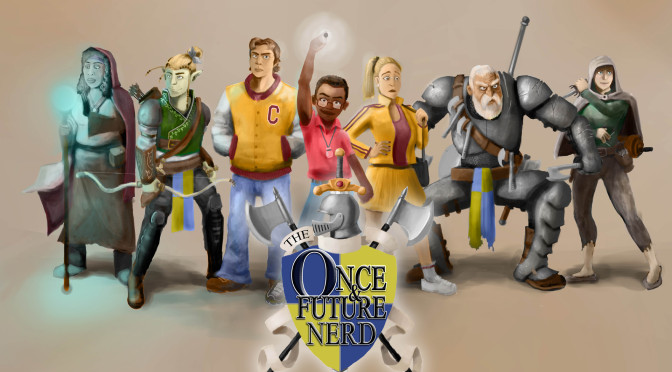
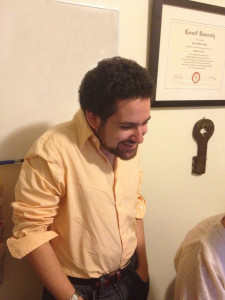
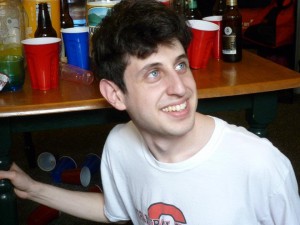
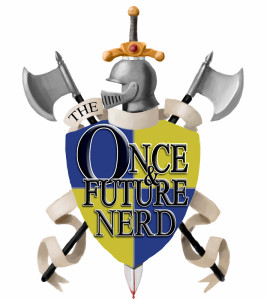

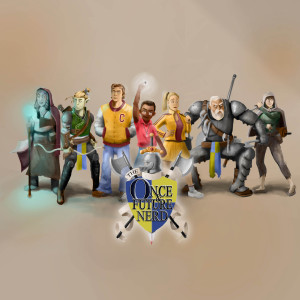

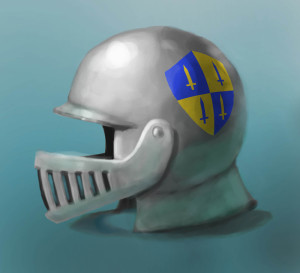
2 thoughts on “Interview with Christian Madera and Zach Glass”